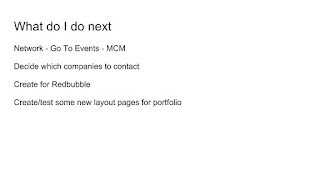In PPP so far, I've mostly looked at the different options I have available to me, since I'm undecided with what exactly I'm going to do when we finish college.
I felt like freelancing was a big thing that I should look into, if only because of all of the options it gives me. I did keep finding more negatives about it though, which might be more because I am unsure about doing it. I like the idea of being able to try so many different things, especially if my portfolio contains illustration as well as design for games/animation, but with the financial side and the amount of networking you have to do to get jobs etc, it is a little bit daunting.
It's partially the constant job searches that I find off putting when it comes to freelance and being in charge of my own work, so I've been looking at agencies as an alternative. I was surprised to find agencies aimed towards gaming companies along with agencies for other areas involving art, and I thought that would be interesting to look into especially as it could allow me to specialise even more in the future. The benefits and limitations of working for an agency are as above. I'm not yet decided if working for an agency would be quite right for me yet, either.
I thought that it would be worth looking at the recurring requirements I've seen when looking at companies as well, just to know what would be needed if I did work for a company. A lot of companies I have found only hire people in for certain projects which means that their requirements might be completely different depending on the brief which does make it a bit harder to research some things that they want, but I found a few points that most if not all of the character design jobs had that I found (a fair few of which were on the animation jobs website). A lot of the jobs I looked at were from Nickelodeon as well just because they have a lot going at the moment, and it was interesting to see how little experience some of them actually asked for.
Even though it is a little less work based, I've also been looking into different art books. I want my portfolio to stand out and look good, so I'm investigating different ways to lay out my pages and make them look interesting. I'd have to be careful not to make them too busy and stop my designs from fading into the background which is why I want to look at quite a few. I like the Persona 4 Arena art book on this slide because not only does it have all of your usual design elements, but it also has diagrams of how the characters actually move, showing key frames of their fighting animations which give you a much clearer idea of how they act.
Some work much better being simple, though. The page on the left which I think is from Cloudy with a Chance of Meatballs has a really nice contrast between the drawn designs and 3D models. The models show how they would look in the actual animation, whereas the drawings show personalities etc much more making it quite a balanced page. On the right, Morrigan from Dragon Age has the different parts of her outfit shown as more of a guide to her outfit than the design process, and since it's so finished the more decorative page looks a lot better. Despite the detail in the borders, the page is still nice and clear and the character does not get lost in the background, keeping the page nice and readable.
After researching these slides, I'm still not 100% sure what to take further and what sort of plan I should focus on, so I've made a simple list of the next things that I need to do. I'm definitely going to go to more events even though I'm still trying to plan it all out, and I want to have business cards made and ready by then. I need to decide on what companies to visit, if companies are in fact the best way to go; I'm not sure if talking to freelancers or conversing with agencies would be a better idea for me yet. I want to make more things for Redbubble since I've stopped and haven't had anything new on for ages just as something to keep designing for no matter what kind of job I go for. Last on my list for now is creating new portfolio pages, including editing older pages and experimenting with layouts for newer pages.
I think once I visit/decide where I'm visiting I'll have a clearer idea of which way to research and start working towards, since a lot of my portfolio depends on that and start making more connections.






